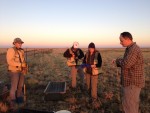The Shortgrass Steppe (SGS) Long Term Ecological Research (LTER) project will end in 2014 after more than three decades of operation. Consequently, it is time to reflect upon past work and activities of the project, which is currently in the second of its final three years of decommission support. As part of decommissioning, our efforts in information management are focused on making data packages available to scientists and other end-users in the broader community through the LTER Data Portal.
In addition, Nicole Kaplan, SGS information manager for over 15 years, is leading an effort to collect stories from scientists, graduate students and support staff who have been associated with the site. Kaplan is collaborating with Helena Karasti, an interdisciplinary scholar based at the University of Oulu, Finland, and the Luleå Technical University, Sweden, who is a member of the Finnish LTSER Network and has worked with LTER networks since 2002. Dr. Karasti attended the 2012 LTER All Scientists Meeting (ASM) in Estes Park, Colorado, as an International LTER participant.
Starting at ASM and continuing the following week, Karasti and Kaplan conducted over 20 interviews and group discussions with SGS LTER scientists, staff and alumni. The interviews elicited diverse views and accounts of career building within the SGS in particular and the LTER Network in general, science leadership and institutional context, and approaches to conducting collaborative research over the long-term. The interviews also offered an opportunity to raise issues related to the decommissioning of a site in the LTER Network, and to discuss future directions and strategies for use of the local research site and the Shortgrass Steppe Research and Interpretation Center in Nunn, Colorado.
The resulting stories may capture underlying assumptions about the evolving conceptual models of the ecosystem in use, reveal fortuitous incidents that helped shape new directions in the scientific process over the long-term, and explain changes in methodologies over time. These multi-voiced stories and perspectives of conducting research and teaching on the shortgrass steppe will be woven together into a publication, The Science Stories Behind the Data – A Biography of the SGS-LTER. In the first phase of this effort, Kaplan and Karasti will work through transcripts of over 40 hours of audio recordings to build an understanding of joint activities and dynamics of research on the SGS ecosystem, and the ecological, social, and technical contexts essential to understanding site-based long-term research.
Emerging themes from these stories about the SGS LTER project reveal deep roots in the International Biome Program, establishment as one of the first LTER sites in the Network, and abundant collaborations across the LTER Network. They also reveal that over the course of its 30-plus years of existence, SGS has produced many valuable research findings, pioneered education and outreach programs, and formed deep connections with the local community. Identified themes will be woven into a rich trajectory of narratives, including insights about conducting science over the long-term in the shortgrass steppe and historical features of the LTER Network. Above all, the effort provides an opportunity to formally recognize contributions that SGS has made to science and to the LTER community.
Coming soon: a website chronicling the progress of this effort and archives of the stories.
By Nicole Kaplan (SGS), Helena Karasti (University of Oulu, Finland ) & John Moore (SGS)

 Enlarge this image
Enlarge this image